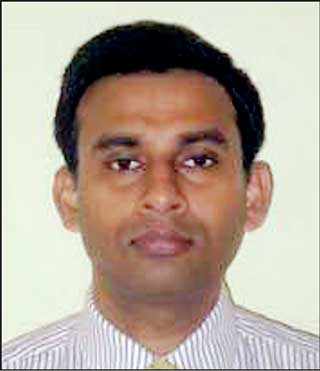Tuesday Feb 17, 2026
Tuesday Feb 17, 2026
Wednesday, 1 December 2021 00:00 - - {{hitsCtrl.values.hits}}
Universities are regarded as a country’s think tanks that educate and research. They shape a nation’s future by providing vital strategic suggestions. By establishing relationships with the general public, especially the
 |
| University of Peradeniya Science Industry Interaction Cell Director and Professor in Statistics & Computer Science Prof. Roshan Dharshana Yapa |
 |
| Uva-Wellassa University Business Linkage Cell Director and Social Enterprise Sri Lanka project Coordinator Dr. Sampath Dharmadasa |
entrepreneurial community, Government universities are trying to boost the local economy while addressing social and environmental challenges.
In this regard, both Uva-Wellassa and Peradeniya Universities in the Central Province have established themselves as focal points for business promotion in their provinces. Their latest aim is to improve local communities’ livelihoods by promoting social enterprise. A business strategy that empowers individuals, families, and communities to engage in economic activities that serve society, people, and the environment. Many businesses allocate a portion of their profits to resolving the issues in the community that they have identified.
Uva-Wellassa University consists of four faculties. The project, dubbed Social Enterprise Support Sri Lanka (SESS), is sponsored by the British Council under an EU grant for integrated rural development in Uva and Central provinces. To promote social entrepreneurship inside the university and in Badulla and Monaragala areas, SESS built a Social Enterprise Incubator. The incubator seeks to offer coaching and advisory services to social entrepreneurs in addition to initial start-up assistance.
The notion of social enterprise is crucial for sustainable development in Sri Lanka, particularly in Uva, one of the country’s most marginalised areas. The organisation works closely with rural and estate communities, providing solutions to their problems.
“Our mission is to help people solve problems, generate new ideas, and start enterprises. Individuals interested in the process will receive aid from the incubator’s other colleagues, and the enterprises created will benefit their own neighbourhood. That’s what social enterprise incubators want. We will definitely accomplish it,” said Dr. Sampath Dharmadasa, Director of the University Business Linkage Cell and Coordinator of the Social Enterprise Sri Lanka project at the Uva-Wellassa University.
The investigation discovered that the province has a 30-year history of social entrepreneurship. Its purpose is to recruit and collaborate with them. There are also many young people with fresh ideas. For example, polythene and plastic consumption has resulted in substantial waste problem. One of the social entrepreneurs has found a way to reduce plastic waste. He made a robust, durable, and reusable brick from waste plastic. Developing fresh entrepreneurial concepts to address social and environmental challenges can help society while running a business. Training is provided till the person transforms their idea into a business. Seven social entrepreneurship training courses have been created so far.
Considering the province’s ethnic diversity, the institution has made these modules available in both national languages. “The provincial council has five ministries and one department that deals directly with social services. We’re helping them find issues and solutions. We do this to assure the project’s success,” Dr. Dharmadasa stated.
Two courses have been developed to introduce the subject to university undergraduates. Socio-entrepreneurship is one of the main topics of an MSc program in agriculture and rural development. Another degree program, named Agriculture Enterprise Development and Management, will feature social entrepreneurship as a subject.
University students and scholars, like local government officials, have endorsed the proposal. This SESS project represents all four faculties and has committed to productively include social entrepreneurship into their curricula. The University of Uva-Wellassa Vice Chancellor supports this research. He provides unwavering support and meets with the Project Advisory Committee monthly.
The University of Peradeniya’s Business Linkage, Innovation, Incubation and Technology Transfer Office (BLIITTO) is also part of this European Union and British Council funded program. Business Linkage, Innovation, Incubation, and Technology Transfer Office (BLIITTO) Director, Professor Roshan Dharshana Yapa shares Dr. Dharmadasa’s enthusiasm for the project.
The facility serves Kandy, Matale, and Nuwara Eliya Districts in the Central Province. Agriculture-related poverty is a big issue in the central province, as well as throughout Sri Lanka, according to Professor Yapa. While farmers can produce their own food, they cannot sell it at a fair market price. The problem has escalated during the COVID-19 pandemic. Since farmers cannot connect with customers resulting in some agricultural products being discarded.
“However, despite the phrase being new, we have been following these corporative concepts for a long time,” said Professor Yapa. In other words, this form of entrepreneurship is not solely driven by profit. However, the team is seeking to focus on one of the country’s most important challenges right now: food contaminated with chemicals. Some farmers produce organic veggies that meet GAP requirements. In the Dambulla market, people compete with other members of the same community. If these techniques fail to add value, they will automatically revert to more conventional approaches. So, a solution that benefits both the farmer and the final customer must be sought without the involvement of an intermediary. Farmers will also benefit financially from such a strategy.
“External players including Government agents and Assistant GAs from the three districts have helped immensely,” said Prof. Yapa. Regular meetings are conducted to discuss strategy. Discussions have also included businesspeople and organisations like the National Enterprise Development Authority and the Export Development Board. “We thank all stakeholders for their continuous support in attaining our goal,” Prof. Yapa said.
The University of Peradeniya also has developed courses on social entrepreneurship for undergraduates from all faculties and young entrepreneurs from the Central Province. The institution also hopes to build export linkages with social entrepreneurs who can meet export standards.
It is commendable that universities have stepped forward to help our country’s poverty alleviation initiatives. It will surely help raise the poor’s standard of living, preserve the environment, and contribute to the national economy.